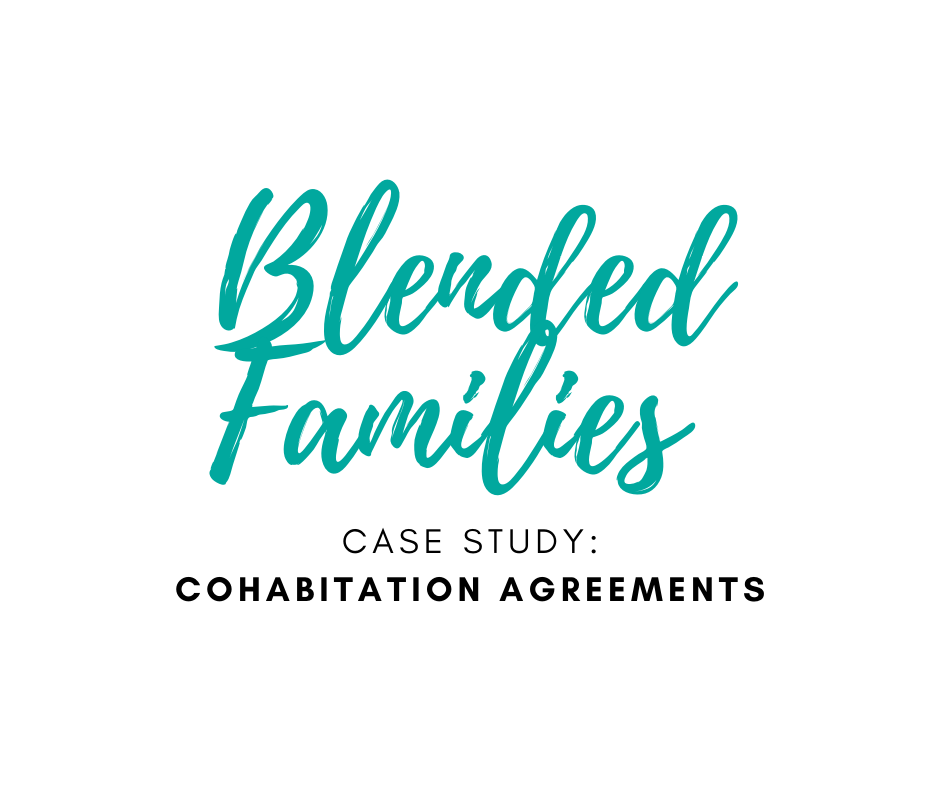Blended Families – cohabitation agreements
In 2020 it is estimated that there were 2.4m separated families in the UK. A large proportion of those couples who have separated will go on to form new relationships and move in with their new partner. Whether there are dependent children living with them or older independent children from the previous relationship, they will factor into future financial planning for their parents.
When couples live together but aren’t married, they do not have the same legal rights as a married couple so far as financial support and asset entitlement is concerned. Legal claims regarding property and inheritance can be brought in certain circumstances but this can give rise to uncertainty and it may not always lead to the outcome that one or both parties, or their families, would have wanted.
To make sure that an unmarried couple protect what assets or financial contributions they are bringing to the relationship and to ensure that both parties and any children may be protected in the future, couples should always look at drawing up:
- a Cohabitation Agreement
- a Will
- a Declaration of Trust, if there is a property which the parties will each have a share in.
Even if a couple have been living together for some time, these documents can and should still be drawn up– there is no rule to say they have to be done at a particular time.
The case study below shows some of the issues which may arise and how they can or could have been dealt with.
Gwen and Ben
Gwen lives with Ben in a house held in Ben’s sole name. They are looking for a suitable property to buy together but can’t find one they both like as much as Ben’s. It isn’t quite big enough for Gwen’s children and grandchildren to come and stay so they decided they will extend Ben’s house using the money Gwen received following her divorce.
The extension is carried out and it significantly increases the value of the property.
Although Gwen’s children are pleased to see their mother settled, they express concern that Gwen has paid a considerable amount of money into a property she does not own. Gwen’s relationship with her daughter, Kate, has been strained since the divorce and Kate’s comments about the “grandchildren’s inheritance “ and “what happens if you leave him too” is causing tension and upset.
To put an end to the arguments, Gwen and Ben each get legal advice. They are told they are right to question what will happen if one of them were to die or if the relationship were to end as it could leave either of them vulnerable for different reasons as well as Gwen’s family potentially missing out on any inheritance she wished to leave them.
Issues to consider:
- How is Gwen’s contribution to the increased value of the house (paying for the extension) and any payments towards ongoing maintenance going to be recognised?
- If Gwen becomes a joint owner or if Gwen’s share is registered (see below), what happens when one of the couple dies?
- Who is to make what contributions to the house and outgoings on a day to day basis? What happens if one pays more than the other? Do the couple intend that that would create more of a share of the property?
- What happens if the relationship breaks down? Does the property get sold? Can one buy the other out? What happens to contents and gifts?
The Solutions
- To protect Gwen’s interest in the property, the house either needs to be transferred into joint names or Ben and Gwen need to draw up a Declaration of Trust.
- Transfer into joint names – this could be 50/50 or unequal shares. This is extremely important to ensure their share can pass as they wish under the terms of their respective wills, if they do not intend the other to automatically inherit it.
- Declaration of Trust – this is a document which states who owns what share of the “beneficial interest” in the property ie the share of any equity. This document is then registered at the Land Registry. This can be done whether the property is owned jointly or in one person’s sole name.
- When the couple have decided what they would want for the other partner if they were to die, they need to have wills drawn up and include their wishes and intentions in a Cohabitation Agreement.
- To deal with the issues of making clear whether any future contributions are intended to increase either party’s share in the property and what should happen if the relationship breaks down, Gwen and Ben are advised to enter into a Cohabitation Agreement together.
For more information on what a Cohabitation Agreement is and why they are important, visit our website Cohabitation Agreement - Vine Law - modern, boutique solicitors based in Cambridgeshire




